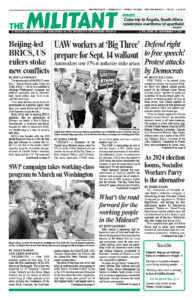Talks toward a diplomatic deal between the rulers of Israel and Saudi Arabia are taking place at the same time that tensions in the Middle East are rising and preparations made for more wars. These conflicts occur amid the unraveling of the old imperialist world order and shifting alliances, accelerated by Moscow’s invasion of Ukraine, as rival regimes compete for markets, raw materials and political influence.
President Joseph Biden’s National Security Advisor Jake Sullivan met with Saudi Crown Prince Mohammed bin Salman in Jeddah, Saudi Arabia, in late July to advance negotiations to establish diplomatic relations between the Saudi and Israeli governments.
As part of the deal the Sunni-based capitalist monarchy in Saudi Arabia wants Washington’s help in developing nuclear power — which could also lead to developing nuclear weapons — as well as acquiring advanced weapons and a stronger commitment of U.S. military backing to counter threats from Tehran, reports the Wall Street Journal.
While U.S. imperialism remains the most powerful military force intervening in the Middle East, U.S. purchases of its oil have declined while purchases by Japan, France and China have increased. The Saudi monarchy is seeking more long-term relations with Beijing, now its largest trading partner at some $100 billion a year.
The latest moves are taking place just five months after the Iranian and Saudi governments reestablished diplomatic relations — with the aid of Beijing — allowing a fragile lull in their decadeslong antagonisms.
Netanyahu wants deal with Saudis
Liberals both in Israel and the U.S. claim Prime Minister Benjamin Netanyahu’s coalition government is “the most right-wing in Israel’s history,” and say its goal is to annex the Palestinian West Bank. But Netanyahu is not about to let the minority of more extreme parties in his coalition sabotage a potential deal with the Saudi rulers, nor let them take actions that would end up boosting the prospects of Hamas, Islamic Jihad and their backers in Tehran. The Israeli police forcibly evacuated Israeli settlers from the “illegal” Aira Shahar outpost in the Palestinian West Bank Aug. 14.
Netanyahu has stated that “there is no political obstacle” to making concessions to the Palestinian Authority, which rules over large sections of the West Bank, if that would help seal a deal with Riyadh.
While a rapid agreement between the two governments is unlikely, the talks stand on the 2020 Abraham Accords, brokered by the Donald Trump administration, which established diplomatic and trade relations between the Israeli government and the governments of Bahrain, United Arab Emirates, Morocco and Sudan.
With or without an official agreement the Saudi and Israeli governments are expanding their relations. In early August Israeli SolarEdge and Saudi conglomerate Ajlan & Bros Holding announced a joint venture for developing solar energy in Saudi Arabia.
Since taking office, the Biden administration has done nothing to win more Arab or Muslim governments to the accords.
Regardless of the goals of the participating capitalist rulers and their politicians, the Abraham Accords and the trade relations that go with them open space for working people of all religions and ethnic groups to meet and work together. This provides better conditions for common action in defense of the interests of the working classes.
And ending the boycott of Israel by Arab regimes strengthens Israel as a refuge for Jews in the face of the worldwide rise in antisemitism.
None of this is to the liking of the Shiite-based bourgeois clerical regime in Iran. To maintain itself in power, it’s driven to extend its counterrevolutionary influence across the region, especially in Iraq, Syria and Lebanon. Tehran makes no secret of its goal to wipe Israel off the map.
At the beginning of August the Pentagon sent 3,000 additional Marines and Navy personnel, backed by the USS Bataan warship and F-35 fighter jets, to the Gulf of Oman in response to what it says was increased harassment of oil tankers and other ships by Iranian forces.
In early August the New York Times reported the Biden administration had agreed to release $6 billion in Iranian government funds in exchange for the regime freeing five imprisoned U.S. citizens. U.S. sanctions against Iran still extract a high price from the Iranian people, even if the regime has succeeded in bypassing some of them.
The New York Sun reported Aug. 21 that the Iranian regime has managed to increase its oil exports from 300,000 barrels a day at the height of Washington’s sanctions during the Trump administration to about 2.2 million today, mostly sold to Beijing.
Tehran: Make Jenin a little Gaza
Tehran aids reactionary Islamist forces throughout the region. This includes Hamas, which rules Gaza with an iron fist, and Hezbollah in Lebanon. It also created militias in Iraq and Syria that have increasingly carried out operations targeting Israel.
Recently Tehran has been sending dynamite and other weapons to its allies in the West Bank — at times via drones — hoping to take advantage of widespread disillusionment with the Palestinian Authority and turn at least the city of Jenin, where Hamas and Islamic Jihad are strongest, into a little Gaza as a base for attacking Israel.
At the same time Hamas has for now kept to its de facto truce in Gaza with the Israeli authorities — even while it boasts about its role in increased terror attacks launched from Jenin on unarmed Jewish civilians in the West Bank and Israel itself. The Israeli regime has granted permits to 20,000 Gazans to work inside Israel.
But this could change on a moment’s notice and the people of Israel could find themselves in a Tehran-instigated multifront war from forces in Gaza, Lebanon and Syria.
In the fight to prevent that possibility becoming a reality, working people in the Palestinian territories, in Israel and throughout the Middle East need to forge mass revolutionary parties, as do workers all around the world. Such parties would unite working people of different national backgrounds and religions to advance our common class interests. They would lead the battle to create an independent Palestinian state alongside Israel, end violence and oppression throughout the region, and rid the world of antisemitic persecution and attacks, on the road to taking power out of the hands of the capitalist class and carrying out a socialist revolution.

